Types of shoe flowers all over the World
1) Hibiscus abelmoschus L
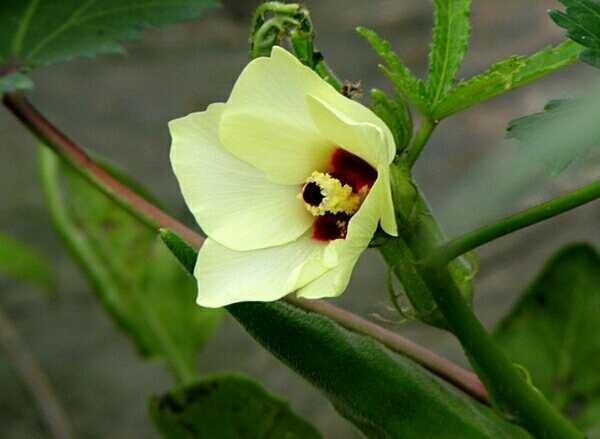
Photo Flower shoe type Hibiscus abelmoschus L
Is a kind of shoe flower that comes from India. Characteristic of this flower is to have sweet seed, yellow, has a musk-like scent or basic ingredients making perfume.
In addition, the seeds of these flowers are usually used as a mixture in making coffee while the young buds can be used as a vegetable.
2) Talipariti tiliaceum (waru tree)
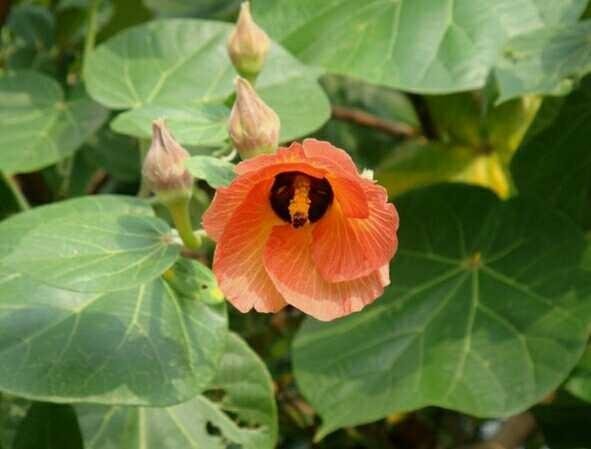
Photo Hibiscus acetosella (Flower waru)
Talipariti tiliaceum or waru tree is one type of shoe flower and can be said that this kind of shoe flowers have the largest size.
In the natural bebasa tree waru able to grow up to reach a height of 4-10 meters with a diameter ranging from 25-50 cm.
The flowers of Talipariti tiliaceum are usually orange colored with the center of pale red or maroon red.
The unique of this type of shoe flowers duannya shaped "love" or heart. In Indonesia, this tree is usually kept to be used for wood.
3) Hibiscus acetosella
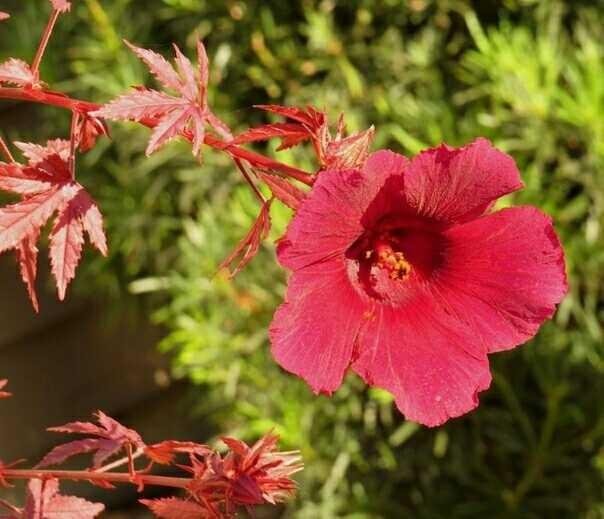
Photo Hibiscus acetosella
Hibiscus acetosella is a type of shoe flower that is thought to have undergone a hybridization process between Hibiscus asper Hook.f. and Hibiscus surattensis L.
This type of flower was first recognized in 1896 by French botanists as distinct plants so given its own name.
This plant was first discovered in rural Africa, precisely in the region of southern Congo-Angola-Zambia.
The plant is then brought to Brazil and Southeast Asia, even now it is considered more popular in Brazil than its first place, Africa.
This flower of jensi is currently cultivated intensively and well groomed in Brazil and served as a vegetable such as spinach.
This plant when viewed at first glance very similar to Japanese maple tree. The flowers are pale orange colored with the center of red maroon color.
This plant mamapu grow to reach length of 170 cm with stem diameter can reach 10 cm.
4) Hibiscus arnottianus (Koki'o'Ula, Hawaiian shoe flowers)
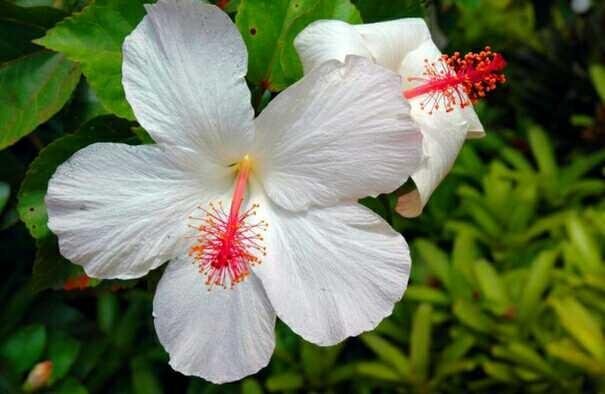
Photo Hibiscus arnottianus (Koki'o'Ula, Hawaiian shoe flowers)
Hibiscus arnottianus A.Gray or commonly called Koki 'o Ke' okay 'o by the Hawaiians, "The chef himself has a white meaning like silver."
The Koki'o 'ula is one of Hawaii's endemic shoemaking species. This plant has a flower that is clean white.
In addition there are three subspecies recognized similarly to the Chef 'o' ula among them are: H. arnottianus ssp arnottianus found in Waianae Range from western Oahu.
H. a ssp immaculatus very rare (listed as endangered) on Molokai and H. a. ssp. punaluuensis from Ko 'Range olau on Oahu.
H. a ssp immaculatus according to the lethargy currently only a few dozen are scattered in the nature of mesic and wet forest.
This flower is sometimes planted as an ornamental plant or crossed with H. rosa-sinensis. In Hawaiian, white hibiscus is known as aloalo pua.
5)Hibiscus rosa-sinensis
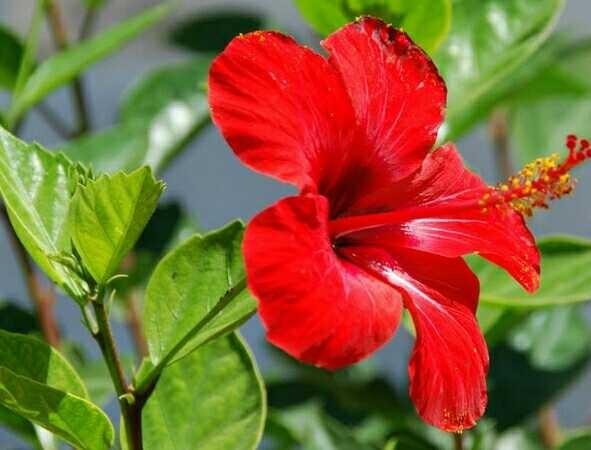
Photo Hibiscus rosa-sinensis (flower sepati)
Hibiscus rosa-sinensis is one of the most common Hibiscus flower we know of with hibiscus, Chinese shoemaking, Hawaiian hibiscus, etc.
This flower is a species of hibiscus that live in the tropics, precisely derived from East Asia.
This plant is able to grow to reach a height of 2-5 meters. Bunagnya bright red with the number of leaf crown reaches 5 strands in each flower.
6) Hibiscus brackenridgei
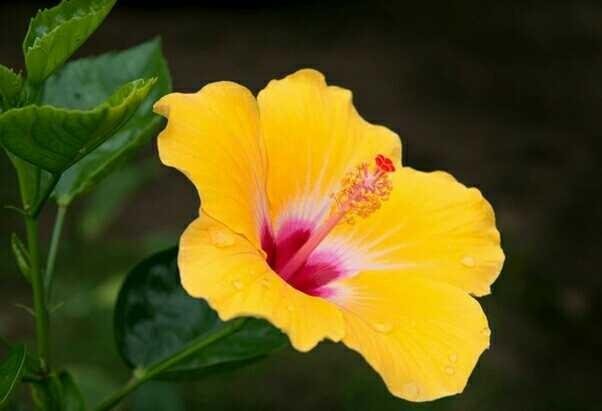
Photo Hibiscus brackenridgei (hawai flower)
Hibiscus brackenridgei or commonly known as ma 'o hau hele by the people of Hawaii. This flower is a Hawaiian endemic bush plant that is able to grow to reach a height of 10 m with bright yellow flowers.
There are two recognized subspecies similar to Hibiscus brackenridgei which are: H. ssp brackenridgei, a subspecies of H. Brackenridgei shoe flower from dry forests such as Molokai, Lanai, Maui, and Hawaiian islands.
H. ssp. mokuleianus, is a plant derived from dry habitats in Kauai and Range Waianae on Oahu. The species is listed as an endangered species by USFWS.
Plants with yellow flowers are used as official flowers from the state of Hawaii since June 1988 6.
Though endangered in its natural habitat, it has grown and is quite popular on every home page in Hawaii.
7) Hibiscus calyphyllus (Lemonyellow Rosemallow)
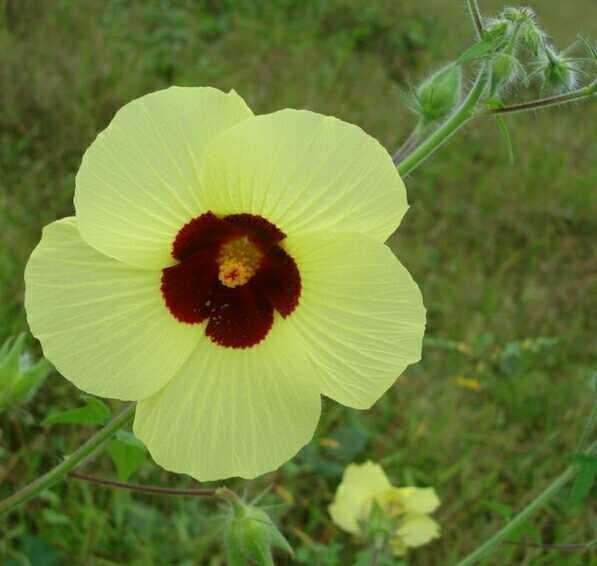
Hibiscus calyphyllus (Lemonyellow Rosemallow)
Hibiscus calyphyllus is one of shoot flower plants that have the ability to grow up to reach a height of 1-1.8 meters (3-6 feet) high.
This plant has flowers that are wide and yellow with brown as the center color.
This yellow flower comes from tropical Africa.
8) Kenaff (Hibiscus cannabinus)
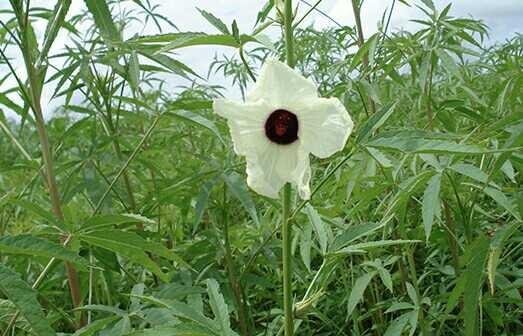
Photo Hibiscus cannabinus (Kenaf)
Kenaf or Hibiscus cannabinus is one of the kind of shoe flower that supposedly comes from south Asia.
Although the authenticity of endemicnya can not be known with certainty. This plant is usually taken wood or stem to serve as the main ingredient of making kenaf paper.
Currently this kenaf plant is widely cultivated in several countries such as India, Bangladesh, United States, Indonesia, Malaysia, South Africa, Vietnam, Thailand, parts of Africa, and for a small part in southeastern Europe.
Characteristic of this plant is to have yellow flowers with brown as its center color. In addition, this plant is able to grow up to a height of 4 meters.
9) Hibiscus coccineus (Scarlet Rosemallow)
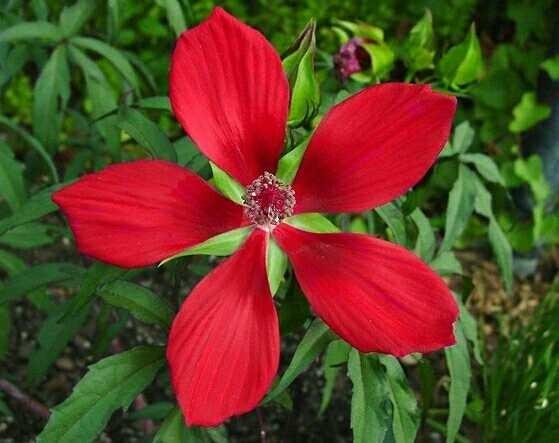
Photo Starfish shoe flower
Hibiscus coccineus or red rosemallow is one type of hibiscus which when viewed at a glance this plant has a resemblance to Cannabis sativa (marijuana).
In addition, this plant is also known as a star flower of Texas, brilliant hibiscus, and red hibiscus.
This plant is easy to find in the swamps, trenches in the coastal plain of Southeast United States.
Hibiscus coccineus is a native plant of Southeastern Northern Virginia from Florida.
Although the general name "Texas Star Hibiscus" does not mean this plant originated from Texas.
This plant will die when winter arrives. In addition to having red flowers, this plant also has a white flower, also known as white Texas star or single hibiscus star.
10) Hibiscus genevii
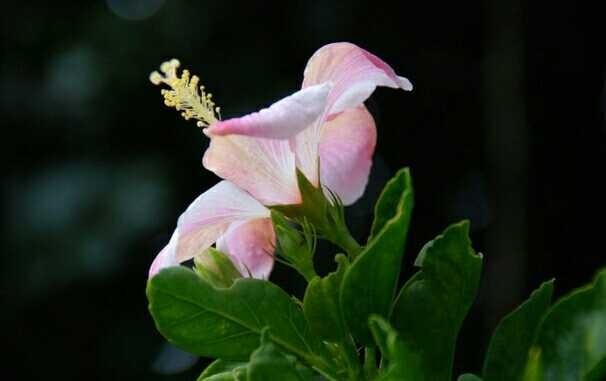
Hibiscus genevii (pink shoe flower)
Genevii flower shoe, is one of the kind of shoestring whose existence is currently endangered and is a native plant endemic to the island of Mauritius.
This flower is known locally with the mandrinette era. This flower was once considered extinct for more than a century, but was rediscovered in 1968.
This plant is able to grow to a height of 3-5 meters with a purple flower, or pink with red as the center color.
In addition, this plant is one of four species of Hibiscus originating from the islands of Mascarene (Mauritius, Reunion, Rodrigues), and has a close relationship with the Hibiscus liliiflorus species of Rodrigues and Hibiscus fragilis.
11)Hibiscus rosa-sinensis
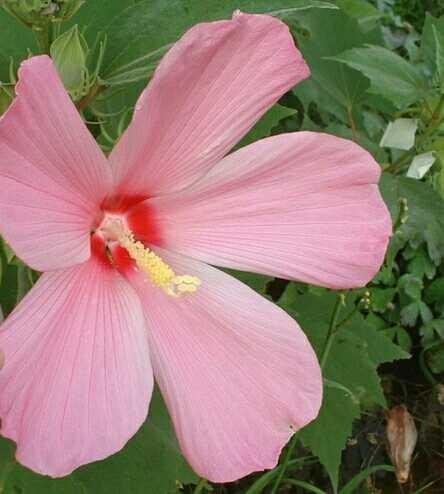
Hibiscus rosa-sinensis (flower sepati)
Pinterest.com
Hibiscus rosa-sinensis is one of the most common Hibiscus flower we know of with hibiscus, Chinese shoemaking, Hawaiian hibiscus, etc.
This flower is a species of hibiscus that live in the tropics, precisely derived from East Asia.
This plant is able to grow to reach a height of 2-5 meters. Bunagnya bright red with the number of leaf crown reaches 5 strands in each flower.
12) Hibiscus brackenridgei
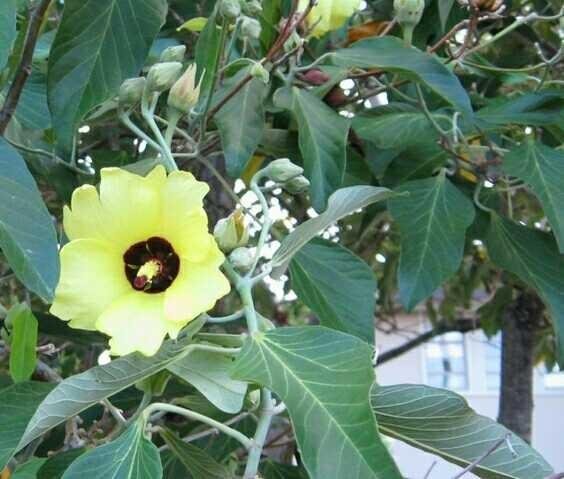
Photo Hibiscus brackenridgei (hawai flower)
Hibiscus brackenridgei or commonly known as ma 'o hau hele by the people of Hawaii. This flower is a Hawaiian endemic bush plant that is able to grow to reach a height of 10 m with bright yellow flowers.
There are two recognized subspecies similar to Hibiscus brackenridgei which are: H. ssp brackenridgei, a subspecies of H. Brackenridgei shoe flower from dry forests such as Molokai, Lanai, Maui, and Hawaiian islands.
H. ssp. mokuleianus, is a plant derived from dry habitats in Kauai and Range Waianae on Oahu. The species is listed as an endangered species by USFWS.
Plants with yellow flowers are used as official flowers from the state of Hawaii since June 1988 6.
Though endangered in its natural habitat, it has grown and is quite popular on every home page in Hawaii.
13) Hibiscus calyphyllus (Lemonyellow Rosemallow)
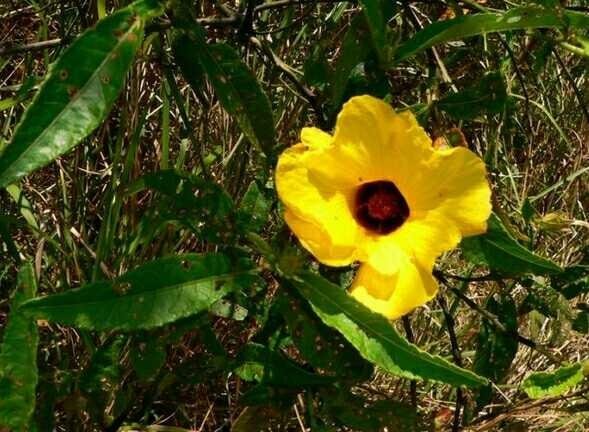
Photo Hibiscus calyphyllus (Lemonyellow Rosemallow)
Hibiscus calyphyllus is one of shoot flower plants that have the ability to grow up to reach a height of 1-1.8 meters (3-6 feet) high.
This plant has flowers that are wide and yellow with brown as the center color.
This yellow flower comes from tropical Africa.
14) Kenaff (Hibiscus cannabinus)
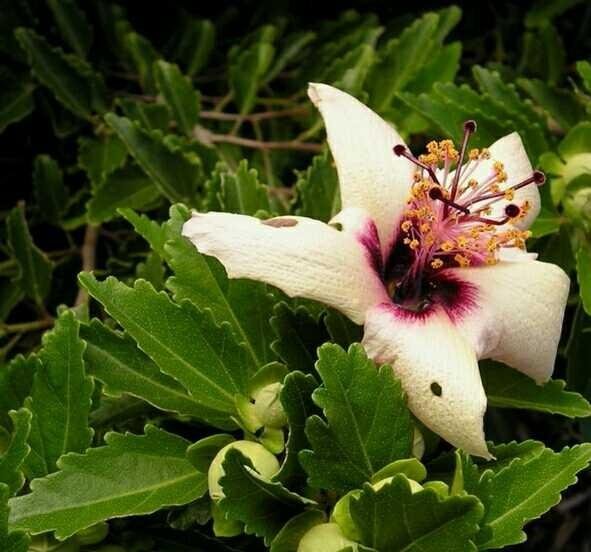
Photo Hibiscus cannabinus (Kenaf)
Kenaf or Hibiscus cannabinus is one of the kind of shoe flower that supposedly comes from south Asia.
Although the authenticity of endemicnya can not be known with certainty. This plant is usually taken wood or stem to serve as the main ingredient of making kenaf paper.
Currently this kenaf plant is widely cultivated in several countries such as India, Bangladesh, United States, Indonesia, Malaysia, South Africa, Vietnam, Thailand, parts of Africa, and for a small part in southeastern Europe.
Characteristic of this plant is to have yellow flowers with brown as its center color. In addition, this plant is able to grow up to a height of 4 meters.

Hibiscus coccineus (Scarlet Rosemallow)
1) Starfish shoe flower

Hibiscus coccineus or red rosemallow is one type of hibiscus which when viewed at a glance this plant has a resemblance to Cannabis sativa (marijuana).
In addition, this plant is also known as a star flower of Texas, brilliant hibiscus, and red hibiscus.
This plant is easy to find in the swamps, trenches in the coastal plain of Southeast United States.
Hibiscus coccineus is a native plant of Southeastern Northern Virginia from Florida.
Although the general name "Texas Star Hibiscus" does not mean this plant originated from Texas.
This plant will die when winter arrives. In addition to having red flowers, this plant also has a white flower, also known as white Texas star or single hibiscus star.
2) Hibiscus genevii
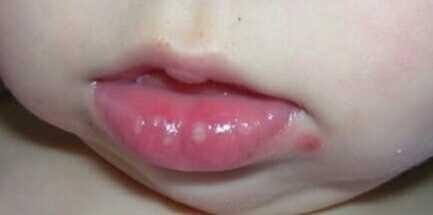
Photo Hibiscus genevii (pink shoe flower)
Genevii flower shoe, is one of the kind of shoestring whose existence is currently endangered and is a native plant endemic to the island of Mauritius.
This flower is known locally with the mandrinette era. This flower was once considered extinct for more than a century, but was rediscovered in 1968.
This plant is able to grow to a height of 3-5 meters with a purple flower, or pink with red as the center color.
In addition, this plant is one of four species of Hibiscus originating from the islands of Mascarene (Mauritius, Reunion, Rodrigues), and has a close relationship with the Hibiscus liliiflorus species of Rodrigues and Hibiscus fragilis.
Thank you for visiting our blog article promoting various types of hibiscus flower.
_______________________________________
hopefully be entertained.
This flower photographed by Hp oppo F1f .. 363 megapixel type camera.
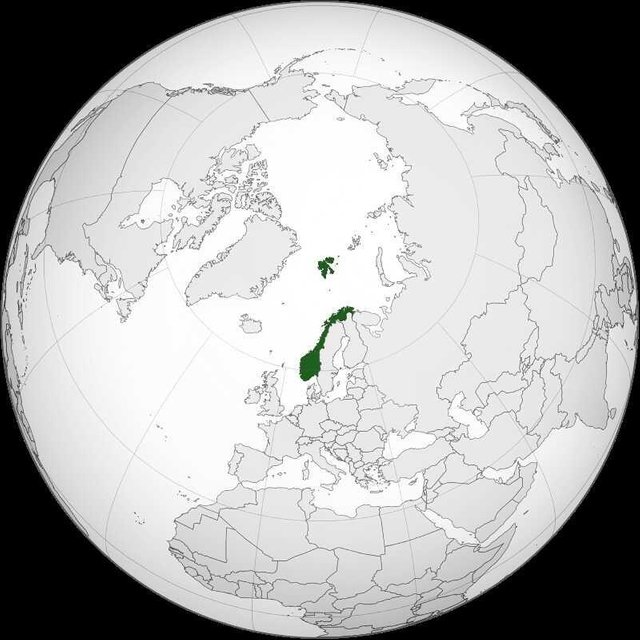
Woff, woff!
Hello @steem-norwegia, Nice to meet you!
I'm a guide dog living in KR community. I can see that you want to contribute to KR community and communicate with other Korean Steemians. I really appreciate it and I'd be more than happy to help.
KR tag is used mainly by Koreans, but we give warm welcome to anyone who wish to use it. I'm here to give you some advice so that your post can be viewed by many more Koreans. I'm a guide dog after all and that's what I do!
Tips:
Unfortunately, Google Translate is terrible at translating English into Korean. You may think you wrote in perfect Korean, but what KR Steemians read is gibberish. Sorry, even Koreans can't understand your post written in Google-Translated Korean.
I sincerely hope that you enjoy Steemit without getting downvotes. Because Steemit is a wonderful place. See? Korean Steemians are kind enough to raise a guide dog(that's me) to help you!
Woff, woff! 🐶
Downvoting a post can decrease pending rewards and make it less visible. Common reasons:
Submit
kr-guide!
Downvoting a post can decrease pending rewards and make it less visible. Common reasons:
Submit